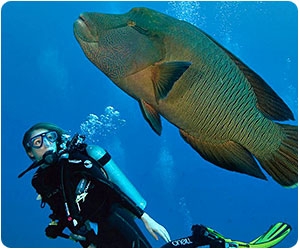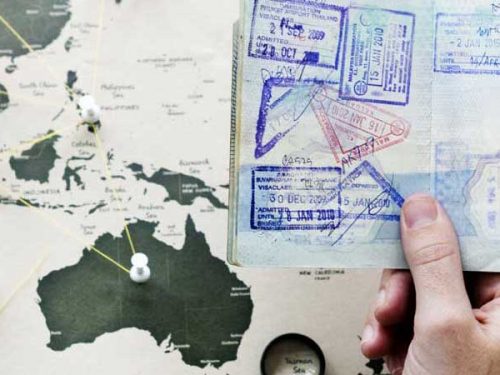 Scuba diving is unlike any other activity. Whether you are hovering weightlessly in a pool or interacting with some colorful and curious marine life, diving will enrich your life. But it’s not something we are born knowing how to do. It takes both a time and monetary commitment to learn how to scuba dive. We hope the following information will answer some of your questions about learning to dive. We want to shed some light on some common questions, so that you can get started diving today.
Scuba diving is unlike any other activity. Whether you are hovering weightlessly in a pool or interacting with some colorful and curious marine life, diving will enrich your life. But it’s not something we are born knowing how to do. It takes both a time and monetary commitment to learn how to scuba dive. We hope the following information will answer some of your questions about learning to dive. We want to shed some light on some common questions, so that you can get started diving today.
How Do I Learn To Dive?
In order to become a scuba diver, you will have to complete a short course and obtain a certificate. The course consists of three parts. First, you will need to partake in knowledge development. This will include practical classes with an instructor or in an online setting. Most courses require you to pass a test or a series of short quizzes in order to progress. You will learn the basics of what you will do in your confined and open water dives, and what to expect when you breathe underwater for the first time.
The second part of the course is the confined water dives. These can take place in either a swimming pool or a body of water with pool-like conditions. During your confined water dives, you will be required to practice and perfect basic scuba skills like breathing underwater, removing your mask underwater, and controlling your buoyancy.
Finally, you will be asked to complete a series of dives in the Û÷open water’, such as a lake, or in the ocean. During these dives, you’ll finally be able to explore the underwater world under the close observation of a dive instructor. If you are able to show an ability to use the scuba diving skills you were taught at this point, you will officially be considered an open water diver and be certified to dive up to 60 feet (18 meters).
 Is It Safe?
Is It Safe?
As with any adventurous sport, scuba diving does carry some risk. During your open water course, you will learn about the dangers involved in diving including decompression sickness, unruly currents, and equipment failures.. However, through proper training, adequate preparation before each dive and a well-executed dive plan, the probability of an accident occurring is minimal. As an added precaution, divemasters and instructors are trained in recognizing potential dangers and diver rescue in the unlikely event that any accident should occur during your training course.
How Long Does It Take To Get Certified?
That’s really up to you! The length of the open water certification course varies, most dive centers offer a variety of plans to fit your schedule and needs. Courses last a minimum of three days, but the practical sessions, confined dives and open water dives can be spread out over a few months if your schedule requires this.
 Where Can I learn? Do I Have To Do It In A Cold Lake?
Where Can I learn? Do I Have To Do It In A Cold Lake?
There are dive centers and instructors in most countries around the world, and just because there may not be an ocean nearby, doesn’t mean you cannot learn to scuba dive! You can very likely learn to scuba dive close to home, be it in a quarry, aquarium, river or lake. Alternatively, some new divers will complete the academic portion of their training at home in a classroom as a local dive shop, and then get a referral to complete their open water dives in a tropical locale, giving them the benefit of utilizing their new found skills in warm water. You can scuba dive anywhere there is water. From the Arctic to the Caribbean, scuba divers explore the blue depths and become ambassadors for all that is in it.
How Much Does It Cost To Learn? Is It An Expensive Hobby?
Scuba diving does require a somewhat high initial investment. An introductory certificate costs at least a couple hundred dollars, but prices vary based on the course type, the location and the dive center. In addition to the course cost, you may wish to invest in your own equipment. The cost of gear adds up, but once you have purchased a set, there is no need to spend on renting gear every time you want to dive. In the end, you will only need to purchase an “air fill”, know as a tank of air for every dive, saving you money in the long run.
You can compare the cost of learning to dive to any other adventurous sport or outdoor activity. Take downhill skiing for example. Initially, you will spend on skiing lesson and a set of skis, but after the initial investment, you only need to purchase a lift pass on every ski trip.
The benefits of scuba diving far outweigh the costs. You gain access to a wide range of environments and feel a new sense of camaraderie with you fellow divers. Scuba diving is a skill you never lose once you have learned it once, although many would benefit from a refresher course if it has been awhile since your last dive.
Am I Fit Enough? Do I Have To Be A Good Swimmer?
Scuba diving does have some basic fitness requirements, but they probably aren’t as stringent as you think. First, you must be at least 10 years old and have a medical release from a doctor if you suffer from or have previously suffered from a serious medical condition. Second, you must be able to swim 200 yards (200 meters) and be able to float or tread water for 10 minutes. If that sounds like a piece of cake, then you are definitely fit enough to become a scuba diver.
Hopefully we have convinced you to begin your scuba diving journey. If you still have questions or would appreciate a referral to a local dive shop to help you book your open water course, don’t hesitate to contact us via phone or email.







